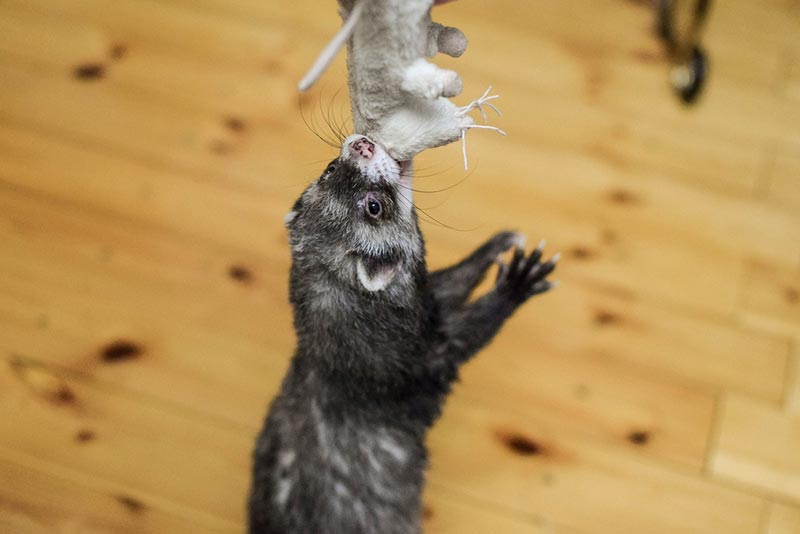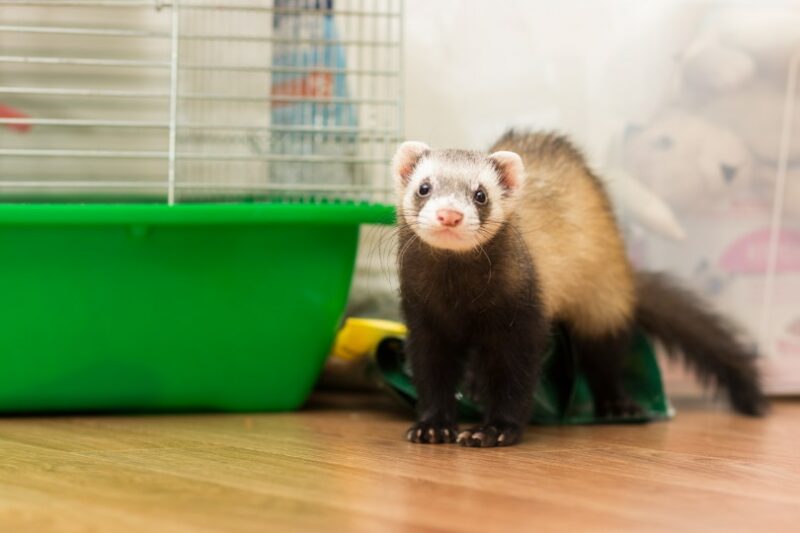
It used to be that the only pets you may have as a kid were just dogs and cats. There was the occasional parakeet or canary. Today, the pet industry has expanded to host a wide range of animals, from boas to cockatoos to tarantulas. Interestingly, many of these exotics had a history with humans before making their way to the pet shop.
Chileans raised chinchillas for food and fur. The Celts tapped dogs for hunting duties. The segue to the retail market was a natural one once people learned about their desirable features. Domestication encouraged beneficial traits. However, that doesn’t mean that everything about ferrets is cut and dried. There are several things you need to know before you bring this small masked animal into your home.
Over 326,000 American households have at least one ferret. Their popularity took off in the 1980s. They aren’t quite as unusual as they once were. Now you can find a plethora of products geared toward these friendly mustelids, a reference to the taxonomic family of which they are a part. Let’s delve into what you need to know if you’ve been considering getting one as a pet.
The 10 Things You Should Know Before Getting a Pet Ferret
1. You can housebreak a ferret.
Housebreaking plays on some of the instincts that many animals have in the wild. Waste communicates a lot of information to other predators and prey species. Wildlife has adapted to minimizes how much they present to the outside world to give them a hunting edge. Ferrets take to a litterbox readily as a modern version of this natural drive.
2. You can leash train a ferret.

The critical thing to remember about leash training your ferret is to get a harness made for these critters. Not unlike cats, they can easily slip out of something that doesn’t conform to their unique body shape. Because of the animal’s speed and hiding ability, it could have tragic consequences. He only needs a lightweight lead. Just be careful not to give him too much slack.
- Read Also: How Many Babies Do Ferrets Have in a Litter?
3. Ferrets need vaccinations, too.
The American Ferret Association (AFA) recommends that you talk about vaccinating your ferret with your veterinarian. Any medical procedure—even vaccinations—carries health risks. Typically, the series includes both canine distemper and rabies. Note the type of the former. Cats also get both these vaccinations, but ferrets lean more toward dogs in their biology.
4. Ferrets resemble their wild relatives.
If you’ve ever seen a weasel or mink in the wild, you probably could mistake your pet for one of them. They have the same elongated body, pointy nose, and coloration. As with dogs and cats, selective breeding has brought other variations to the mix. While you may rarely see an albino mink, they are an option with ferret breeders. The same applies to cinnamon, champagne, or black sable.
See Also:
- 4 Reasons Why Ferrets Steal (& How to Stop Them)
- Chocolate Ferret: Pictures, Facts & Rarity
- Black Sable Ferret: Facts, Traits, and Rarity (With Pictures)
5. Ferrets must eat meat.
Ferrets are part of the order of Carnivora. That means they must eat meat. They actually have trouble digesting plant foods. We can go as far as to call them hypercarnivores. Commercial diets provide them with the nutrients they need, geared toward their digestive needs. It also relates to our previous point about their likeness to other weasels and minks. They have similar bodies and physiologies.
Related Read: What Do Ferrets Eat in the Wild and as Pets?
6. Ferrets began domestic life as hunters.

One thing you’ll figure out quickly when you invite a ferret into your home is how easily he get into tight places. He can get under furniture or in just about any opening. That ability lent himself well toward being a hunter of rodents and rabbits. The Romans figured it out early in their relationship. It wasn’t much of a job, either. After all, that’s food for a hungry ferret.
7. Ferrets aren’t legal in all states.
Most communities regulate pets to some degree, whether you have to get a license or limit the number of animals. Ferrets are no exception. Their hunter traits threw a wrench in the works. It’s one reason that states like California and Hawaii have banned them. They represent a threat to native wildlife populations, leaving them no defense against this predator.
- Related Read: Why Is My Ferret Shaking? Should I Do Something?
8. Ferrets are generally spayed/neutered and de-scented before you buy one.
Members of the Weasel family share a common trait—they are aromatic. It’s part of their intricate communication system. That’s probably the main reason that any ferret you’d buy today is both altered and descented. Male ferrets, like tomcats, will spray. Doing both procedures at the same time minimizes the health risks of these invasive surgeries.
9. Ferrets do best with more than one pal.
Ferrets love company. They differ from their wild counterparts, the black-footed ferret, which is mainly solitary. They bond strongly with their fellow mustelids. If you don’t have time to interact a lot with your pet, at least get him a friend or two. It’ll improve his quality of life and keep him physically and mentally healthy.
10. You can show your ferret.
Ferrets are more than pets to many people. That’s why there is the AFA. If you want to take things to the next level, you can show your ferret. It’s an excellent way to get your kids involved with the husbandry and connect with other enthusiasts. It’s worth noting that you must present vaccination records to events.
Related Read:
- Do Ferrets Like to Cuddle? Everything You Need To Know!
- Are Ferrets Carnivores? What You Need To Know!
- Do Dogs And Ferrets Get Along? What You Need To Know!
Conclusion
A ferret is an excellent choice for the individual or older child ready to take on the responsibility of this unique pet. They form strong bonds with their owners, making it a rewarding experience. This guy has his challenges when it comes to letting him loose in the house. However, the responsible pet owner will ensure he has the necessary supervision balanced with adequate exercise and mental stimulation.
- How Much Does It Cost to Own a Ferret?
- 11 Ferret Sounds and Their Meanings (with Audio)
- What Do Ferrets Like To Play With? 11 Toys Ferrets Love
- 10 Fun Games You Can Play With Your Ferret
Featured Image Credit By: CC0 Public Domain, pxhere









